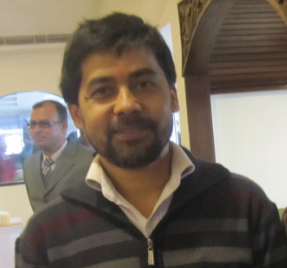Chandra Dev Bhatta, Nepal
The crisis in conducting foreign policy and maintaining national security are also posing serious threat to state-building process in Nepal. It is safe to say that both have not gained serious political attention.
There is a huge gap between political forces and national security organs of the state.
The security organs and their members have been undermined, discouraged and demoralized in many occasions by the successive government(s).
The establishment of ‘youth wings’ across the political parties and their tendency to flout rule of law for partisan interests is hitting the nerve of law and order.
Similarly, unavailability of clear national vision on foreign policy, other than the traditional values based on the principles of Panchasheel, non-alignment will not be able to address the changing global, regional and national political and economic challenges.
Foreign policy is not something isolated and separate from the domestic policy, it is rather reflection and complementary of the domestic policy.
Foreign policy involves formulation and implementation of a group of principles which shapes the behavior pattern of a state while negotiating with other states to protect or further its vital interests.
The principal element of a country’s foreign policy is their national interest based on factors such as geography, economy, political tradition, military, external situations and historical imperatives.
The overarching aim of any foreign policy is to protect national interest, interest of the citizens living within and outside the state and maintain “geographical integrity and strategic interest” of the nation and develop new strategies in the comity of states to preserve national interests regardless of domestic disparities.
States whether big or small, hence, have similar if not identical but limited menu of choices unless they are fascinated by ambitious agenda of imperialism’ or any other ‘ism’.
Therefore, in order to have a vibrant foreign policy in place all political forces will need to have a general consensus on issues of national interest such as geography, economy, political traditions, military, external situations and historical imperatives.
Historically, both Ranas and Shahs conducted foreign policy of Nepal to fulfill their regime interests and always undermined national interests.
Same formulae was applied by the post 1990s government which resulted in biggest foreign policy fissures with many issues remaining either unsettled or unattended at all.
The classic examples are the Bhutanese refugee crisis, the Mahakali Treaty (sharing water of Mahakali River), developing Detailed Project Report (DPR) of Pancheshwor, border disputes and encroachment of Nepali land in more than 60 places including Susta and Kalapani, Gorkha recruitment; Nepal’s declining representation in the world affairs, changing aid scenario and many more.
Political parties of then and now never had national consensus on key foreign policy issues.
Majority of political parties through media and their political manifesto have been demanding to do away with 1950 treaty with India which has largely been considered as ‘unequal’.
But we have not done any homework. It is not clear whether we want to cancel it, replace it, amend it or review it whereas India has repeatedly expressed its desire to work as per Nepalese interest.
Domestic politics of this country has never been stable for nearly a century mainly due to rivalry among ruling elites and the rulers have been interplaying with foreign policy ever since.
For example –during the Rana regime, they became close with British India and offered troops to the British Army, Panchayat rulers’ defined foreign policy to protect the interest of the regime and during the democratic era starting from 1990 till today political parties of various colors have conducted foreign policy to suit their partisan interest.
By and large, Nepal’s external relations only came into limelight ‘if and only if’ that can be used to balance domestic political gain.
Today, Nepal has ‘no foreign policy’ in a sense that it can address the challenges of new time.
It has no capacity or any mechanism to protect citizens in the event of crisis or personal injuries who are working abroad and sending remittances which has become the life- blood of the national economy.
In terms of policy document, all political parties have expressed to adopt non-aligned foreign policy except CPN (Maoist) who said that it would like to adopt genuine non- aligned foreign policy but it is yet to be known what the genuine non-aligned foreign policy is.
However, it is noteworthy to quote what Gopal Kiranti in the latest interview ( some time back) has said, “by abandoning the renegade definition of Nepal as a yam between two rocks”, the People’s Republic of Nepal will establish a strong definition of nationality.
This definition will be ’dynamite’ between the two rocks in 21st century rather than a yam,” grounded on “proletarian internationalism.”
What we lack, at present, is ‘consensuses among political parties.
For example – we complain about foreign interference (real and fictitious) in our internal affairs but we do not have any mechanism to counter these interferences, neither have we had strategy that would guide us to deal with these emerging challenges nor there is coherence and common voice among political parties.
In fact it is we not them who are inviting this interference.
Similarly, Nepalese have been raising about border encroachment for the last so many years but leaders have not been able to develop any mechanism to counter this unabated encroachment nor have they seriously taken up issue at the political level.
Foreign policy of Nepal is conducted on the basis of whims and vernacular media report that foreign powers have captured key political figures from all political parties to serve their interests.
The challenge is how are we going to deal with immediate neighbors particularly with India and China when the bilateral relations between these two countries are rapidly changing for the better and friendly nation particularly with the US, the UK and the European Union, Japan and other distant nations in the context of changing domestic as well as international scenario in the days to come.

Moreover, when the West, particularly the US and the UK, is coordinating their Nepal policy through India, under these circumstances it has become difficult for Nepal to conduct balanced foreign relations.
There is a broader consensus in Nepal on the question of equi-proximity relation between India and China.
In fact with this policy one can serve the interest of Nepal by maintaining balance in the relation of the two neighbors and taking benefit from the economic development of them.
But in reality this policy has never been implemented particularly because of the reluctance from the part of our Southern neighbor (Gajurel 2008).
Both China and India are likely to dominate world affairs in the days to come both in strategic and economic front and success and failure of Nepalese foreign policy depends whether its leaders can take advantage of this ‘boom’ of the half-of the world or not.
Nepal neither has the strength to play one country against another (Pandey 2008:5) nor does it have any perceived threat from outside.
Faced with this reality, Nepal does not have much choice and ambition left other than developing its capacity as an economically viable state that can protect its citizen both outside and inside and create an environment where citizens can prosper with dignity.
Moreover, Nepalese should not be worried in advancing relations with China merely because it is a communist state and retreat its relations with India just because some of the political parties blame it as an ‘expansionist’ power.
That it has to do is to manage internal security and put its house in the order, prioritize foreign policy agenda and reap benefits from regional and global economic participation.
End text.
Excerpts from authors’ book on “Challenges of State Building in Nepal”, a FES publication. Thanks FES and the distinguished author: Ed. Upadhyaya.
# This article was published in the Telegraph Weekly a few years back.

